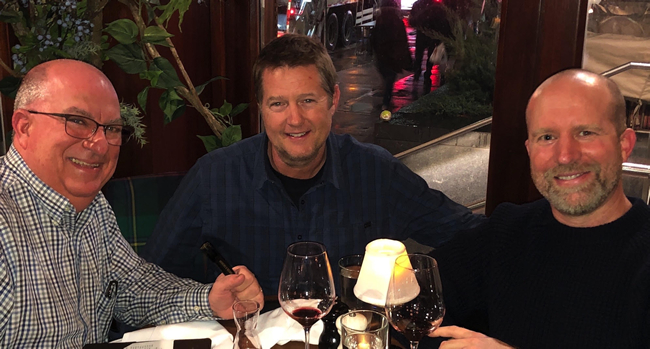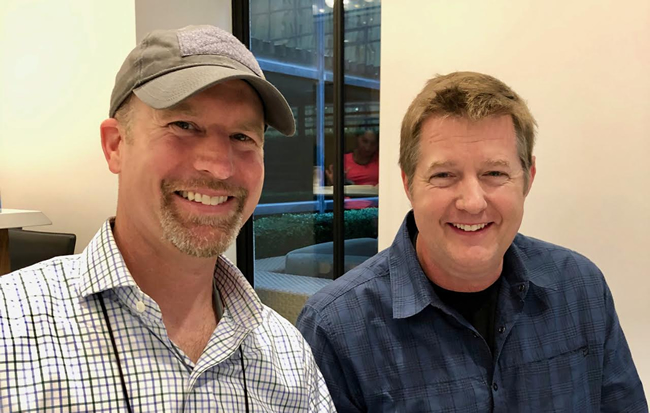

Up Close: Brian Andrews and Jeffrey Wilson
Light at the End of the Tunnel
 By Dawn Ius
By Dawn Ius
These days, even a question as simple as “How are you?” can be daunting—good news is a little hard to come by in 2020. But for Brian Andrews and Jeffrey Wilson, co-authors of the Tier 1 military thriller series (and more!), there are a few bright lights on the horizon of what’s turning out to be a very dark year.
First, there’s the launch of the sixth installment of their popular Tier 1 series—COLLATERAL—in which Task Force Ember is in the midst of mourning their dead—fallout from last year’s Red Specter—when they’re tasked with a new, even more dangerous mission. The team is heading back to Russia to once again face off against Russian spymaster Arkady Zhokov.
More on that story in the interview below, but while we’re on the subject of good news, the duo is also gearing up for the launch of the first book in a Tier 1 spin-off Sons of Valor series, and will also be kicking off a new faith-based supernatural series called The Shepherds.
But wait! There’s more…
So, hey guys—what’s new?
Brian Andrews: Since you asked, we’re ecstatic to announce that we’ve signed a deal with the W. E. B. Griffin estate to carry on the Presidential Agent series for Putnam! We’ll be working closely with Penguin’s very own Tom Colgan to bring Charley Castillo back to the page, where he’ll take on missions only the Presidential Agent can tackle. The last installment in the series, Book 8, Hazardous Duty, came out in 2013 and left plenty of room for both the characters and the series to evolve. And while carrying the torch for the iconic W. E. B. Griffin is both humbling and intimidating, we’re excited to continue the saga for existing readers and introduce the series to new readers looking for novels with high-stakes geopolitics, military characters, and of course, action and intrigue.
That’s massive news. Congratulations! Obviously W. E. B. Griffin was a tremendous writer and leaves some big shoes to fill. What does it mean for you to be asked to continue his legacy, and how nervous are you?
Jeffrey Wilson: Big shoes indeed! I grew up reading the Brotherhood of War and The Corps series, and the thought that Brian and I will now be continuing the Presidential Agent series is a lot to get your head around. Nobody can write like W. E. B. Griffin, and one thing that has made it comfortable and less intimidating is both the estate and the amazing Tom Colgan over at Penguin, both of whom committed early to support our vision and encouraged us to write as Andrews and Wilson and bring our own style to the amazing characters Griffin created in this series. It also helps that seven years has passed in the Presidential Agent universe. By the time our book comes out, a lot will have changed for both Castillo and in the world, affording us the opportunity to pick up at the next stage of the evolution.

Andrews (right) and Wilson (middle) at a Presidential Agent series celebration dinner with Tom Colgan.
Do you think it’s more difficult or easier to write characters created by someone else, versus coming up with your own?
BA: That’s a great question and a topic that we’ve discussed more than you know. Both have their challenges, but I think writing other authors’ characters is probably more difficult. For example, when writing Charley Castillo, there is always an element of doubt needling your brain in the background: “Am I staying true to the character that W. E. B. Griffin wrote?”
As an author and creator of original characters in our other novels, I’m intimately familiar with the process of bringing characters to life. Every character has a unique soul and personality, and no matter what happens to them, that soul should be both recognizable and familiar to readers as the series evolves. Only W. E. B. Griffin truly understood what was in Charley’s head—how he thought and felt. Now, as a steward of the series, our job is to try to preserve the soul of Griffin’s characters and have them act in ways that are consistent and authentic with how they did in the past. Hopefully, fans of the series will recognize Charley’s soul in our books even though our voice and writing style is different from Griffin’s.
Speaking of characters of your own, I loved the new Tier 1 book, COLLATERAL. I’m always happy to be back with Dempsey and his team. This is the sixth book in the series—what do you think has been Dempsey’s—and maybe the team’s—biggest growth?
BA: When you first meet up with the Ember team, they’re licking their proverbial wounds inflicted in the last book. Many of the team members are not in a good place—psychologically, that is. Dempsey is no different. Yes, he’s hardened and tough, but he’s not immune to grief. As the team leader, the burden of shouldering not only his own angst but also that of his teammates falls squarely on his shoulders. And in COLLATERAL, that is exactly what we see him do—rise to the occasion, carrying all the extra load that is asked of him in order to haul his team out of the abyss. This is true leadership and Dempsey’s greatest opportunity for growth in the series to date.
COLLATERAL starts off with a somber note—the team has lost a lot. There’s some great emotion here. How has your past experience helped you tap into that?
JW: As Brian said, just because you’re a warrior does not make you immune to grief. I’m no stranger to loss. I’m no stranger to grief…but it’s the relationships that you forge in the service that serve as a backstop so you don’t fall off the cliff. Oftentimes the true weight of the loss doesn’t really begin to crush you until after that last deployment as you enter a new stage of life. Before then, there’s always the next evolution, training, or deployment to focus on. It not only keeps your mind off the loss, it allows you to rationalize that you’re doing the best possible thing to honor your lost teammates—carrying on the fight in which they were lost. We tried to reproduce this aspect of grieving into this novel. I can tell you that, in real life, I’ve spoken to many veterans who don’t feel the true weight of the loss until often many years later, when they finally leave service, and then these ghosts from the past come knocking and demanding attention.
We’re back facing off against Russia for this one—which feels extremely relevant for the current political landscape. What can you share about the spark for this story, and how it transformed into this edge-of-the-seat story of action and espionage?
JW: I’d love to tell you that we’re prescient, genius geopolitical analysts, but the truth is we often just get lucky. Obviously, the Russian threat is one that has been in the background brewing for many years, and anyone connected to the military or intelligence communities is aware of the threat. That it bubbled over into the forefront was inevitable, I suppose, but when we started on a path of this next trilogy of books, beginning with American Operator, continuing in Red Specter, and now culminating with COLLATERAL, we didn’t really know how timely the subject of Russian covert and false flag operations would be. The real spark was our desire to explore just how this generation of covert operators and warriors would adapt to such a shift in threat, and this is something we think about with our real-life military and IC all the time. We’re coming up on two decades now fighting primarily against Islamic terrorism, which means that the guys on the pointy edge of the spear today have likely never faced any other type of threat. That means a huge paradigm shift, when you’re used to hunting terrorists in the Hindu Kush in remote and primitive villages, and now you face a threat that is your true equal in terms of resources and technology. That’s what we tried to explore here, and it turned out to be quite timely.
What this did allow us to do was to be able to truly ratchet up the global stakes. This is the first time we’ve written our team into a scenario where we truly are on the brink of a world war, with big players and lots of powerful weapons. Writing troops on the ground, and Arleigh Burke trying to survive cat and mouse against Russian destroyers and subs in the Black Sea, Marine F-35s and USAF F-22s conducting operations all while Team Ember tries to defeat the covert threat and pull us back from the brink of war was really, really fun and exciting.
Speaking of action—you guys write great action. What tips would you give for writing action that doesn’t feel forced or cliched?
BA: We’ve come to think of action as a hallmark of our brand, so it’s wonderful to hear you say that. As far as tips go, I’ll give you three:
TIP #1 — Most authors write action sequences that are simply too short. A few paragraphs sprinkled here and there in a 400-page novel simply doesn’t meet the threshold in today’s market. Every Andrews & Wilson novel has multi-chapter action sequences. Don’t be afraid to draw it out. Which leads me nicely into tip #2.
TIP #2 — Think of every action sequence as a miniature three-act play. Jeff and I happen to write our books using the three act structure, but we also apply this framework to the action scenes. Part I is the inciting event, Part II is complication, Part III is climax and resolution. This technique is very helpful to crafting a dramatic and satisfying action sequence. It also gives you the framework necessary for writing longer action scenes with bigger stakes and more drama.
TIP #3 — Establish parity in advance between opposing forces. This will allow for a longer “duel” without asking the readers to suspend their disbelief, pulling them out of a scene that should otherwise be sucking them in. This does not mean both hero and villain have to be martial arts champions or sharpshooters. In fact, mirror image skill sets are less interesting. Map out the strengths and weaknesses of both sides before the conflict begins, then during the middle of the fight (e.g., the Part II complication) play with these elements to escalate the engagement as both sides try to one-up the other to achieve victory.
Thank you, thank you, thank you for writing strong, intelligent female characters. I know that can be a challenge given the still somewhat limited role women have in these real-life situations. How do you go about developing Grimes and Petra? What are some of the challenges you navigate—and how do you navigate them?
JW: We love writing strong, intelligent female characters, so thanks for noticing! Finding the proper POV voice for our female protagonists can be a challenge, but we have friends and family to help with that—both Brian and I are married to strong female characters ourselves! And the truth is, our female characters are merely a reflection of reality. I served in the Special Operations and intelligence communities alongside a large number of highly capable, highly motivated, and very talented women there. They were courageous, inspiring, and brought a different perspective. I channel what I witnessed in real life—women serving in frontline roles within the various communities bringing their own strengths, and sometimes weaknesses, to the table. I’ve deployed with Special Warfare units with women aboard, flown F-18s with a female fighter pilot who was the best of the best, and served beside numerous OGA women downrange, so I’ve got lots of role models to write from.
We definitely end COLLATERAL with the door open for more—given your new contract, plus a more recent deal to write some paranormal-inspired books for a new publisher, when can readers expect a new Tier 1 installment?
BA: Well, our readers will get more Tier One action next June when the spinoff, shared universe series Sons of Valor launches from Blackstone. We’re excited to be able to bring fan favorite Keith “Chunk” Redman and his SEALs to readers in a new series. Yes, the schedule is tighter than ever before, with Book 1 in The Shepherds coming next September and our first installment in the W. E. B. Griffin Presidential Agent series coming late next year. But rest assured—Dempsey and the Ember Team aren’t going anywhere! Look for Book 7, Dempsey, coming next winter, and we know our readers will like where the story takes John next!
It’s a tough time to be publishing a book right now—so many distractions. With in-person events canceled, tours postponed, etc, how are you adapting your promotion for COLLATERAL? Anything significant/exciting you’d like to share?
JW: It’s a different world these days for sure, but the world of book tour appearances has been evolving even before COVID hit. We have a number of appearances scheduled on podcasts, radio, and TV, and we’re thrilled to be part of our first, open to the public, live Facebook Q&A with Slaven Tomasi from Lima Charlie coming September 8th at 6:30 p.m. EST. Look for announcements about this, and all of our upcoming appearances on our website, www.andrews-wilson.com. We encourage readers to sign up for our newsletter there, as we have tons of special promotions and giveaways only available to our subscribers.
A few months ago, you shared some great advice with our readers for “surviving quarantine”—and at the time, I think many of us thought this might have ended by now. Do you have any additional advice to share about working through the distractions?
BA: As a point of reference, the typical fast attack submarine deployment is six months long—which is about how long it’s been since I wrote that article. So I’m with you, this is about the time I was hoping to be “pulling into port and off on liberty.” Unfortunately, COVID had other plans for all of us. Which means, as you suggest, it’s probably worth revisiting the topic. Here’s three items to add to my original list:
- Move the finish line. Psychologically, I think it is important to verbalize and accept the fact that reality threw us a curveball. We thought we signed up for a 10K, but five miles into the race we discovered it’s actually a marathon. Okay, let that sink in. The original goal was hard, but it seemed manageable. We thought we saw the end in sight. But that was a mirage. We’re still stuck in the desert and we have no choice but to keep moving. I know you’re tired. I know you’re discouraged, but you gotta keep putting one foot in front of the other until you cross the finish line.
- Count your blessings: No, it’s not trite. For me, it is emotionally stabilizing to remind myself that things could be worse. I could be destitute and alone. I could be breaking rocks in a Russian gulag. I could be trapped in a zombie apocalypse with a sprained ankle. Whenever you feel like you’re drowning in a downward spiral, then make a list of all the good things in your life— things that make you buoyant. Things that make you happy and give you hope. Read that list often and use it to recalibrate your mental state when defeatist thinking creeps in.
- Help others cope. Wouldn’t it be nice if someone made you laugh to take your mind off this nightmare? Wouldn’t it be nice if a friend called you up just to ask how you’re doing? Wouldn’t it be nice if on the day you were feeling most overwhelmed you got an uplifting, humorous, or empathetic text message from a colleague, family member, or loved one? I imagine any of those things would brighten your day tenfold. So reach out and be that person for somebody else. It is amazing to me how much spiritual sustenance a simple gesture of thoughtfulness can provide. The times people have surprised me with unexpected, unsolicited kindness or empathy burn like little beacons in my memory. Thoughtfulness is fuel for all souls in a pandemic.
- On the Cover: Alisa Lynn Valdés - March 31, 2023
- On the Cover: Melissa Cassera - March 31, 2023
- Behind the Scenes: From Book to Netflix - March 31, 2023

